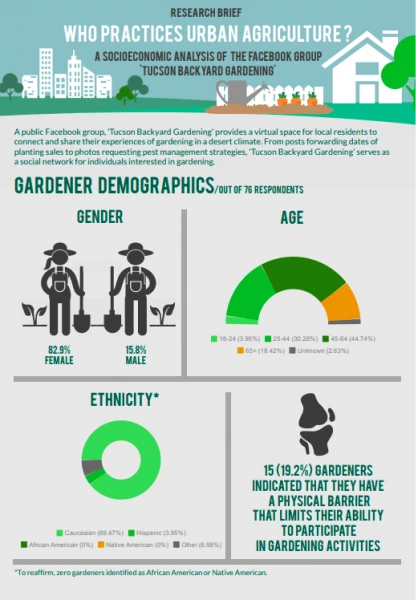
Through the comprehensive collection and analysis of interviews conducted with backyard and community gardeners, the project developed several materials to connect gardeners to locally available resources, advance academic research on the benefits and barriers of urban agriculture, and inform local policies and programs that influence urban food security and agricultural production.
Greening the Food Deserts Handout
In this two-page handout, you will find a summary of the applied research project, ‘Greening the Food Deserts of Tucson, Arizona.’ This includes the project’s research goals and its contributions to urban agriculture programs in Tucson. In addition, an overview of the project’s key findings is provided, as well as local policy and program recommendations.
Download Report:
In Brief: Greening the Food Deserts of Tucson, Arizona
Socioeconomic Analysis of Las Milpitas de Cottonwood
Run by the Community Food Bank of Southern Arizona, Las Milpitas de Cottonwood is a six-acre community farm that serves as a gardening and educational cornerstone in Tucson. At no cost, Las Milpitas offers local residents the materials and support necessary for growing their own food, thereby making fresh produce more accessible to the wider community. To learn more about the community members participating in urban agriculture activities at Las Milpitas, the project administered a survey to gardeners planting at the community farm during the spring of 2017. Therefore, this research brief provides an overview of the results obtained through the survey.
Download Report:
Research Brief: Who Practices Urban Agriculture? A Socioeconomic Analysis of Las Milpitas de Cottonwood Community Farm in Tucson, Arizona
Socioeconomic Analysis of Tucson Backyard Gardening
A public Facebook group, ‘Tucson Backyard Gardening’ provides a virtual space for local residents to connect and share their experiences of gardening in a desert climate. To learn more about the gardeners of ‘Tucson Backyard Gardening,’ the project administered an online survey through the Facebook group. This research brief visually presents the survey’s results.
Download Report:
Research Brief: Who Practices Urban Agriculture? A Socioeconomic Analysis of the Facebook Group ‘Tucson Backyard Gardening’
Socioeconomic Analysis of New Roots Program
Enabling greater integration into their new communities, the International Rescue Committee’s New Roots Program provides refugee families with the space, materials and training to participate in community gardening activities throughout Tucson. By engaging in community gardening, refugees are able to cultivate fresh, nutritious food while connecting with their neighbors. Advanced gardeners of the program can complete a certificate course offered through the IRC’s MicroProducer Academy, which teaches refugees how to grow and sell produce for market. In 2017, the ‘Greening Tucson’ project conducted focus group interviews with refugees to learn more about the social benefits of the New Roots Program, as well as the urban gardening aspirations refugees have. This research brief visually presents program statistics and gardener quotes collected throughout the duration of the project.
Download Report:
Research Brief: Who Practices Urban Agriculture? A Socioeconomic Analysis of the IRC’s New Roots Program in Tucson, Arizona
Resource Guide for Gardeners
In this resource guide, you will find a compilation of urban agriculture resources available to Tucson’s gardeners This encompasses many of the organizations, businesses and councils working to provide gardeners with the knowledge, skills and materials to more successfully participate in urban community and backyard gardening. In addition, the guide includes a collection of handouts created by local organizations to equip gardeners with basic, yet essential information, such as how to plant with a seasonal calendar, as well as repair drip irrigation lines. With Tucson’s rich agricultural history, we hope this informational guide will further connect local gardeners to the organizations, businesses and communities committed to building a healthy, sustainable food system in Tucson, Arizona.
Download Report:
Tucson’s Urban Agriculture Network: A Resource Guide for Gardeners
A "Print Version" is customized so that the handouts in the appendix are on separate pieces of paper to allow them to be hung in garden sheds or passed around during a community garden meeting, for example. Alternatively, you can view and print out any of the handouts we included by clicking on the titles of the items in the appendix when viewing the resource guide as a pdf file on a computer. The content in the "Print Version" is exactly the same as in the original and the only difference is blank pages inserted between specific pages.

